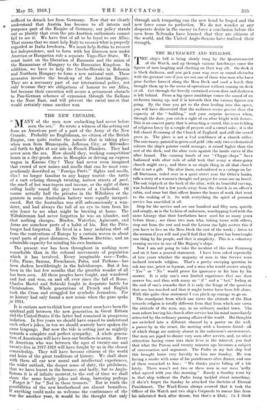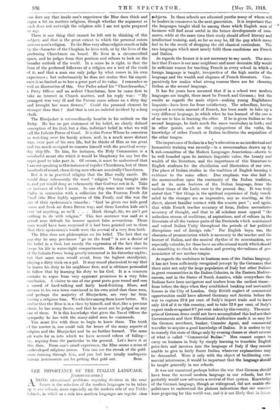THE BLUEJACKET AND RELIGION.
ri-IHE ship's bell is being slowly rung by the Quartermaster of the Watch, and up through various hatchways come the figures of men laughing and chatting on their way aft. On deck it is black darkness, and you pick your way over or round obstacles with the greatest care if you are not one of those wise men who have gone further forrard along the Mess Deck and used a hatch that brought them up to the scene of operations without coming on deck at all. Get through the heavily curtained screen-door and darkness is left behind. From a big space amidships comes the sound of an orchestra tuning up, and it is towards that the various figures are going. By the time you get to the door leading into this space, you will have discovered that the audience seems greeter than the capacity of the "" building," and your surprise increases when, through the door, you catch a sight of an altar bright with flowers. This is no concert party that is attracting a crowd, this is no tickling of religious fancy by a couple of prayers and a cornet solo ; it is the full choral Evensong of the Church of England, and still the crowd press in. The place is not a bad semblance of a church either. The sanctuary, painted in green and gold (the only two ecclesiastical colours the ship's painter could manage), is raised higher than the rest of the deck, and the altar rests against the inside curve of the after funnel. The cunning hands of our " Chippy-chaps " have
fashioned wide altar rails of solid teak that many a shore-going church might envy, and there is no single thing in all that church that is not a gift. The altar linen, embroidered in a cottage on far- off Dartmoor, toiled over in a quiet street near the Otter's banks, tells a story of a woman's thought and prayer for sonic one on board. The oak triptych at the back of the altar, with its beautiful carving, was fashioned but a few yards away from the church in an officer's cabin, and none but that officer knows the hours of work that went to the making of it. So with everything the spirit of personal service has sanctified it all. .
Stop for the service and see one hundred and fifty men, quietly and simply, as is the fashion of sailormen, worshipping God with the same Liturgy that their forefathers have used for so many years before them ; see those two men who, taking turns with others, step out from the rest and read the Lesson (no light matter this if you have to live on the Mess Deck the rest of the week) ; listen to the sermon if you will and you'll find that the priest has been taught one thing by his people, and that is simplicity. This is a voluntary evening service in one of His Majesty's ships.
Now I am not going to take the incident of this one Evensong and on it base a general statement. I haVe been asked repeatedly of late years whether the majority of men in this Service were inclined towards religion. That's a pretty sweeping question to ask any one, priest or layman, and a man who would answer simply " Yes " or " No " would prove his ignorance or his bias by his answer. It is only one's own limited experience that one dare answer for, and then with many an " if " and a " but feeling at the end of one's remarks that it is only the fringe of the question that one has touched and that it might better have been left alone. With this quite clear statement I can pluck up courage to go on.
The standpoint from which one views the attitude of the Blue
towards religion is totally different from that from which one views the attitude of the man, say, in an ordinary market town. 'I he man ashore leaving his church after service has his mind immediately attracted by the ordinary passing affairs of the world. His thoughts are switched into a different channel by a poster on the wall, a passer-by in the street, the meeting with a business friend— all of which things are entirely absent in the sailorman's environment, Our men are piped to dinner very soon after service, and, no other attraction having come into their lives in the interval, you find that what the Parson said twenty minutes ago becomes a subject of conversation and argument. The Padre in my last ship had this brought home very forcibly to him one Sunday. He was having a smoke with some of his parishioners after dinner, and one of them remarked to him : " We thinks you're falling off a bit lately. There wasn't not two or three men in our mess' 'artily what agreed with you this morning." Rarely a Sunday went by in that ship without the Padre being tackled about something. (I sha'n't forget the Sunday he attacked the doctrine of Eternal Punishment. The Ward-Room always avowed that it took the Officer of the Watch and two ship's Corporals to rescue him from his 'infuriated flock after' dinner, but that's- a libel) So I think one dare say that inside one's experience the Blue does think and argue a bit on matters religious, though whether the argument as such does not outweigh the religious side I am not quite prepared to say.
There is one thing that cannot be left out in thinking of this subject, and that is the great extent to which the personal enters into our men's religion. To the Blue very often religion stands or falls IT the character of the Chaplain he lives with, or by the lives of the professing Churchmen on board. He lives in a circumscribed space, and he judges from that position and refuses to look on the broader outlook of the world. In a sense he is right, in that the lives of the professed followers of a religion are a test of the truth of it, and that a man can only judge by what comes in his own experience ; but unfortunately he does not realize that his experi- ence is so limited as to lose a great part of its value. I remember so well an illustration of this. Our Padre asked his " Churchwarden," a Petty Officer and an ardent Churchman, how he came first to take an interest in Church matters, and his reply was : " My youngest was very ill and the Parson came ashore on a dirty day and brought her some flowers." Could the personal element be stronger than that ? And that is not an isolated incident by a long chalk.
The Bluejacket is extraordinarily humble in his outlook on the Deity. He has no pat statement of his belief, no clearly defined conception of his God, but a dim, indistinct belief in what we will call the Infinite Power of Good. It is this Power Whom he conceives as watching over his family ashore, and, in a much more distant way. over part of his own life, but he thinks of Him as too great and too much occupied to concern himself with the practical every- day ship-life. To him, for instance, the Holy Communion is a wonderful secret rite which it would be blasphemy for any but the super-good to take part in. Of course, it must be understood that I am not speaking in this instance of regular Churchmen, but of those hundreds of sound, clean-living men who are nominally Churchmen.
But it is in practical religion that the Blue really excels. He would deny vehemently the word " religion " being brought into it, and yet would deny as vehemently that God was not in it. Take in instance of what I mean. In one ship some men came to the Padre in connexion with a collection for the Pearson Fresh Air Fund (the Blue highly approves of this Fund), and this was the gist of their spokesman's remarks : " God 'as given our kids good mines and fresh air down Devon way, and these London kids ain't ever 'ad anything, so we'll . . . Mind, though, Sir, we ain't got i.othing to do with religion." This last sentence was said as a proud man defends his honour against false accusations. Those men would have been surprised if it had been pointed out to them that their spokesman's words were the avowal of a very firm faith.
The Blue does not philosophize on his belief. The fact that on pay-day he may perchance " go on the bend " is not a denial of his belief in a God, but merely the expression of the fact that he keeps his life in water-tight compartments. He does not conceive of the Infinite Power being greatly interested in his Saturday nights ; but that same man would avoid, from the highest standpoint, playing a dirty trick on a pal. It may sound pharisaical to say that he learns his duty to his neighbour first, and is ofttimes persuaded to follow that by learning his duty to his God. It is a common mistake to argue from very apparent premisses to a very false conclusion. A visitor to one of our great ports goes round and sees a crowd of hard-talking and fairly hard-drinking Blues, and eturns to his own town convinced in his own mind that these men, and perhaps the majority of Bluejackets, are very -far from having a religious bias. We who live among them know better. We realize that the Blue is in a class by himself, and that, like a precious t tone, he has many facets, and that he must not be judged on any one of them. It is this knowledge that gives the Naval Officer the sympathy he has with the many-sided men he commands.
You must live with them to begin to know them. The truth of the matter is, one could talk for hours of the many aspects of eligion and the Bluejacket and be no further forrard. The same pit waits for us into which we have accused others of falling— Se., arguing from the particular to the general. Let's leave it at this, then. From one's small experience, the Blue seems a mine of undeveloped religious power. You can see the streak of the gold- ream running through him, and you feel how totally inadequate
human instruments are for getting that gold out. Blau.



























 Previous page
Previous page